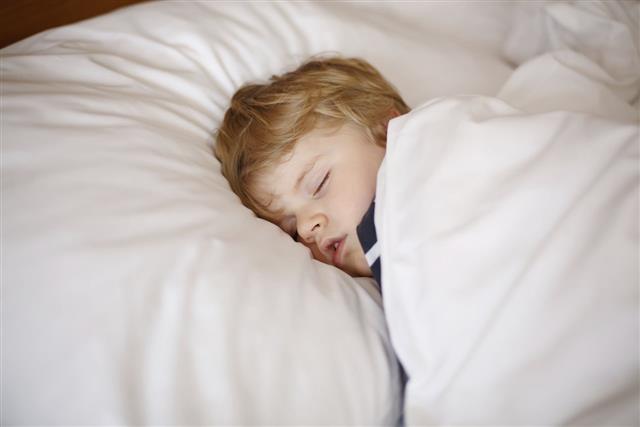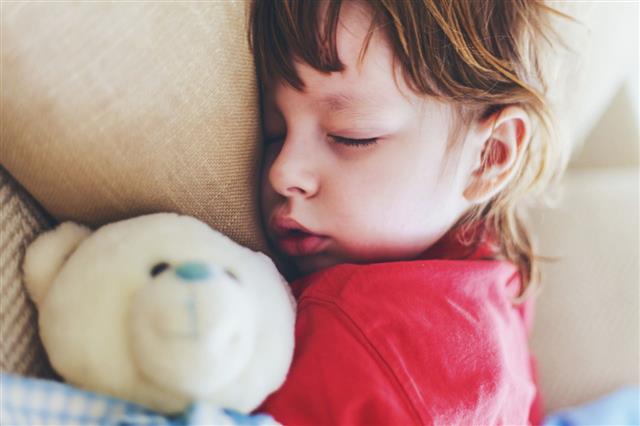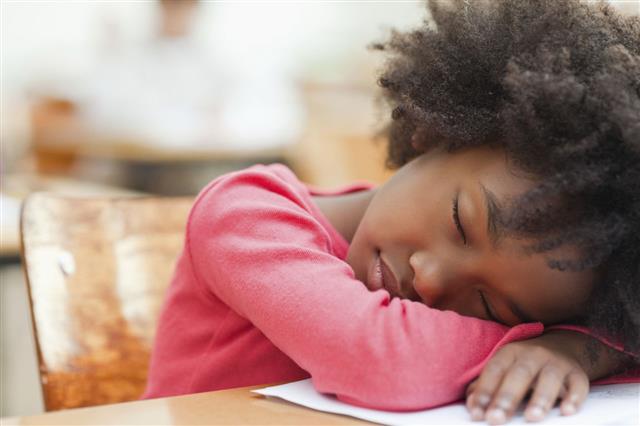
Though doctors caution against the prolonged use of melatonin supplements for children, short-term use may be considered for tackling the issue of insomnia in children who are affected by developmental disorders. However, majority of parents worry about the possible side effects of melatonin for children. The following article provides information on how this synthetic hormone works and whether it is safe for children.
Melatonin is a natural hormone that is secreted by the pineal gland, which is a small endocrine gland located in the brain. Melatonin helps to regulate the body’s circadian rhythm. The secretion of this hormone is a signal for the body to prepare for sleep. Its secretion is regulated by the exposure to light. It peaks during nighttime and drops during the day. Though synthetic melatonin is believed to be quite effective in treating sleep disturbances such as delayed sleep onset syndrome, jet lag, etc., there’s a need to address the issue of health risks. As is the case with any hormone-containing supplement, indiscriminate use of melatonin pills should be avoided. Though melatonin supplements are prescribed for children who have been diagnosed with disorders like Attention-deficit hyperactivity disorder (ADHD), cerebral palsy, and autism, further studies are required to confirm the effectiveness of melatonin as a sleep aid for children.
Sleep Disorders in Children
Insomnia, which refers to the difficulty in falling or staying asleep, could also affect children. Delayed sleep-phase syndrome (DSPS) and behavioral insomnia of childhood are both sleep-related conditions that could affect children. DSPS is a circadian rhythm sleep disorder wherein the onset of sleep is later than the desired bedtime. Sleep latency, which is the time between laying down and the onset of sleep, is longer than normal.
In case of behavioral insomnia of childhood, the affected child doesn’t go to bed until parents tell him/her to do so. At times, he/she may link certain parental activities with sleep. The child may stay awake if his/her expectations regarding the sleep environment are not met. This type of insomnia is called sleep-onset insomnia. Limit-setting insomnia is another type of behavioral insomnia wherein the parents or guardians are unable to enforce proper sleep behavior. Affected children refuse to abide by the bedtime limit set by the parents. This form of behavioral insomnia may be observed in children affected by ADHD. Since autistic children and children who have been diagnosed with ADHD have difficulty in falling asleep, melatonin supplements may be prescribed for them.
Is Melatonin Safe for Children?
Though several research studies have been conducted on the effects of melatonin, only a few of them have analyzed the effects of this synthetic hormone on children. Most of the studies have been conducted on the short-term use of melatonin. Research needs to be done to analyze the long-term effects of this synthetic hormone on the body. Most of the clinical trials have focused on the effects of the use of melatonin in children who have been affected by behavioral and developmental disorders such as ADHD and autism spectrum disorder.
Though giving small doses of melatonin may help ease out the nighttime difficulty of putting children affected by the aforementioned conditions to sleep, most sleep specialists refrain from prescribing these pills for children who are younger than 10 years. Large doses are avoided. More often than not, the dosage is in the range of 0.3 mg to 5 mg. The dosage should not be increased unless the doctor tells you to do so.
Side Effects of Melatonin
The reason why health practitioners do not support the use of melatonin for children is due to the lack of adequate research. Most of the trials that have been conducted involved small number of subjects, and studied the effects of the short-term use of this synthetic hormone. Moreover, the studies have also revealed some side effects associated with the use of melatonin in children. It has been observed that if melatonin is given to children affected by DSPS from a young age, they may experience vivid dreams or nightmares, drowsiness and fatigue, especially if high dosages of melatonin are given.
Side effects of melatonin are usually associated with large doses, and have also been observed in children affected by developmental disabilities or neurological problems. Some of the melatonin side effects in children include headaches, dizziness, lethargy and sleepiness during the day, irritability, mood swings, and stomach cramps. There’s also a need to watch out for adverse drug interactions.
Whether melatonin should be given to children still remains a question to be answered. Though in some cases, children with developmental disorders may have to be given melatonin, parents should first try to establish proper sleeping patterns with the help of natural ways. Although the side effects caused by melatonin are rare, research needs to be conducted to ascertain the effects of long-term use of these pills. Doctors are of the opinion that a child’s brain produces significant amounts of melatonin. Since the effects of extra melatonin on a child’s development are relatively unknown, sleep specialists have cautioned against using it. If your child’s sleep-wake cycle is affected, and he/she often experiences sleep disturbances, do consult a pediatrician immediately.





